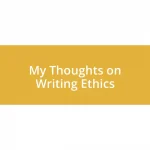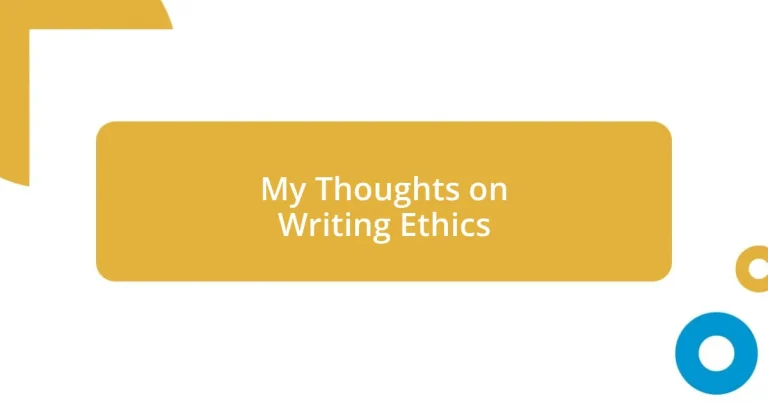Key takeaways:
- Writing ethics are essential for respecting others’ work and enhancing the writer’s integrity.
- Key principles include honesty, integrity, respect for intellectual property, and empathy towards the audience.
- Proper citation and paraphrasing are crucial to avoid plagiarism and to contribute meaningfully to discussions.
- Balancing personal voice with ethical considerations fosters a respectful and constructive dialogue with readers.
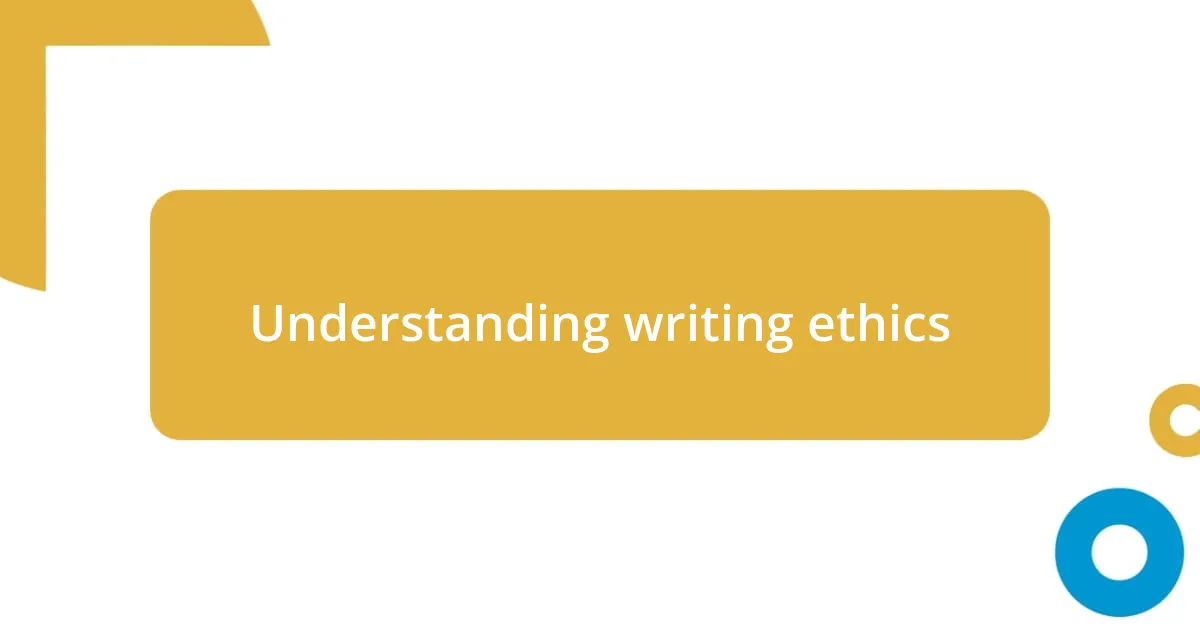
Understanding writing ethics
When I first started writing, I brushed off the idea of writing ethics, thinking they were just rules for academic settings. But over time, I’ve realized that these ethics are vital in shaping how we convey our ideas and respect others’ work. Have you ever considered how your writing impacts someone else’s voice? It’s a profound question that underscores our responsibility as writers.
Writing ethics encompass principles like honesty, integrity, and respect for intellectual property. I remember a moment when a colleague unintentionally lifted language from a source without proper citation. The embarrassment they faced opened my eyes to how easily one can slip into unethical practices. It taught me that acknowledging sources isn’t just about following rules; it’s about valuing the contributions of others in the literary landscape.
Moreover, understanding writing ethics pushes us to engage fully with our audience. When I write, I try to consider how my words might resonate emotionally or informatively with those reading. How often do we pause to reflect on our audience’s perspective? Recognizing that our words can influence opinions or inspire action reminds me of the responsibility we hold in crafting our narratives thoughtfully.
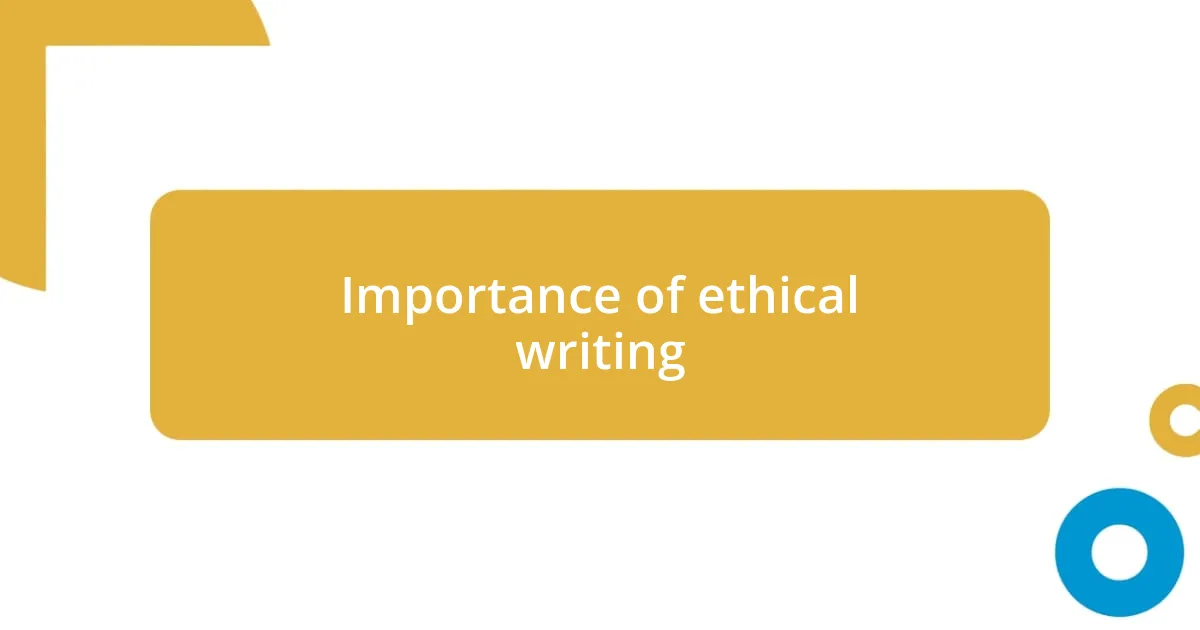
Importance of ethical writing
Ethical writing is crucial because it establishes credibility. When I published my first article, I put so much effort into researching and gathering data. I realized that any misleading information would not only diminish my authority but also affect my readers. Trust is the foundation of effective communication—without it, the message gets lost.
Another aspect of ethical writing is transparency. I recall a time when I had to disclose potential conflicts of interest in a piece I was working on. At first, I hesitated, worrying it might undermine my argument. However, being open about my position reinforced my integrity and fostered a deeper connection with my readers. It’s about showing them that I value their trust just as much as I value my own reputation.
In addition, ethical writing fosters a respectful environment in the writing community. I once participated in a workshop where we critiqued one another’s work. It became apparent that understanding and adhering to ethical practices led to more constructive feedback. When we uplift each other and acknowledge our shared efforts, we enhance the overall quality of our discourse. Isn’t that a rewarding outcome for everyone involved?
| Aspect | Impact |
|---|---|
| Credibility | Builds trust and authority in the writer’s voice. |
| Transparency | Encourages honesty in sharing potential biases. |
| Respect | Creates a supportive community for writers. |
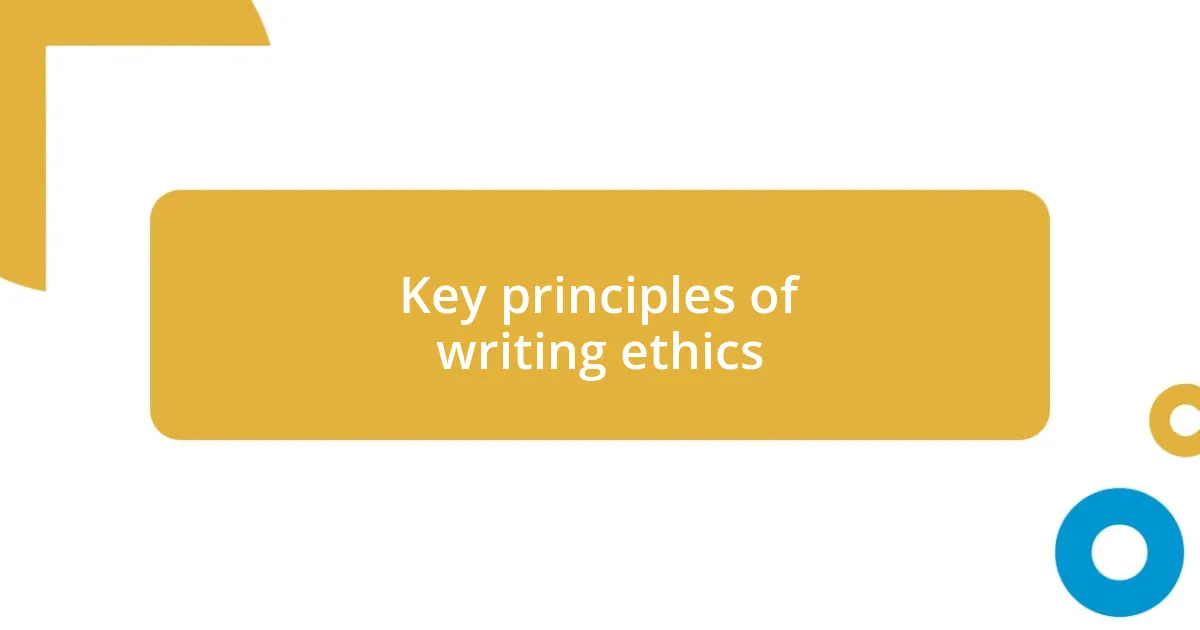
Key principles of writing ethics
Writing ethics hinge on key principles that guide us toward responsible communication. Honesty stands out as a fundamental trait; I once faced a challenging situation where I had to decide whether to alter some statistics to make my argument more compelling. In that moment, I realized that presenting the truth—even when it’s inconvenient—preserves not just my integrity, but that of the entire conversation. Respect for others’ work goes beyond just citations; I treat each source as a mentor that has contributed to my understanding, a perspective that enriches my writing significantly.
Here are some key principles that I believe should always guide ethical writing:
- Honesty: Present information and arguments truthfully, avoiding exaggeration or deception.
- Integrity: Stay true to your values, even when faced with pressure to change your narrative.
- Respect for intellectual property: Always give credit where it’s due, understanding that each contribution shapes the discourse.
- Accuracy: Ensure that facts, figures, and claims are correct and well-supported by reliable sources.
- Empathy: Consider your audience’s perspectives and emotional responses, aiming to connect with them meaningfully.
Reflecting on these principles not only elevates my writing but also fosters a connection with my readers—an aspect I cherish deeply as I navigate the intricate world of words.
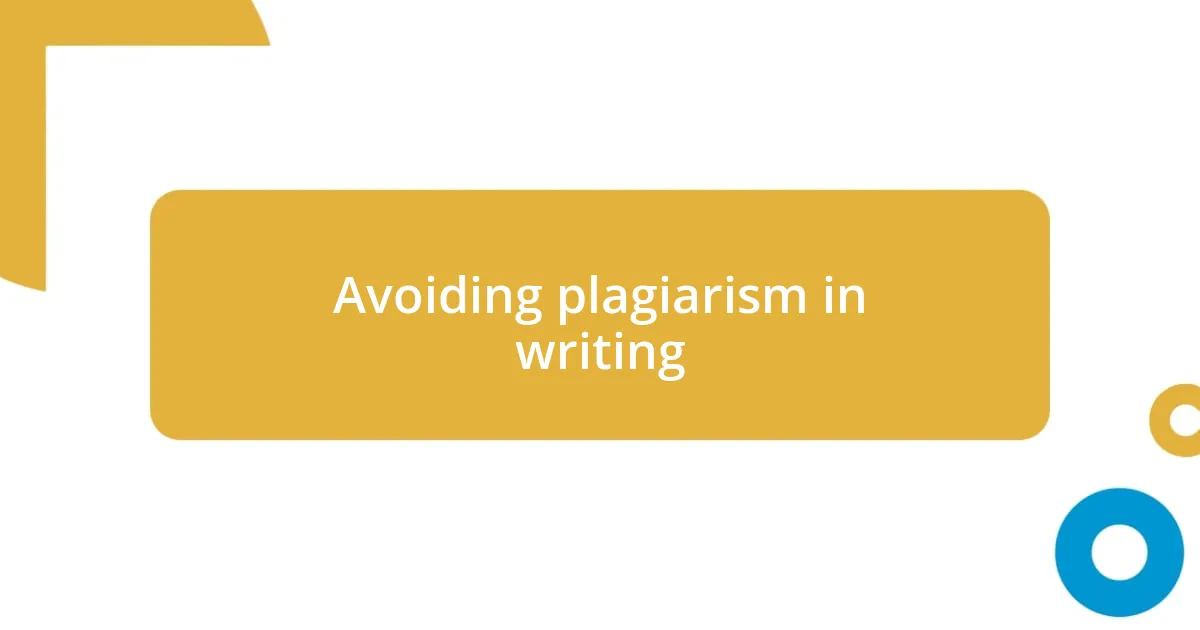
Avoiding plagiarism in writing
One of the simplest yet most effective ways to avoid plagiarism is proper citation. I recall a time during college when I directly quoted a source without adequately attributing it, thinking it would elevate my argument. It didn’t take long for a professor to point it out, leading to an awkward conversation where I had to confront my oversight. Since then, I’ve become meticulous about attributing sources, truly appreciating how citations not only protect my integrity but also enrich the conversation by showcasing others’ ideas.
Additionally, paraphrasing is a valuable skill that I’ve honed over time. It’s not enough just to change a few words; I’ve learned that true paraphrasing involves deeply understanding the original text and then expressing that idea in my own voice. For instance, after reading a thought-provoking article on climate change, I took time to digest the information before discussing it with friends. By restructuring my thoughts and expressing them in a unique way, I not only avoided plagiarism but also made the content more relatable for my audience.
It’s crucial to cultivate a mindset that values originality and respects others’ efforts. I often ask myself, “How can I add my unique perspective to this topic?” When I view writing as an opportunity to share collective insights rather than just a task to complete, it encourages me to engage with sources ethically and respectfully. This shift in perspective has transformed my writing process into a creative and ethical journey, allowing me to forge meaningful connections with both my sources and readers.
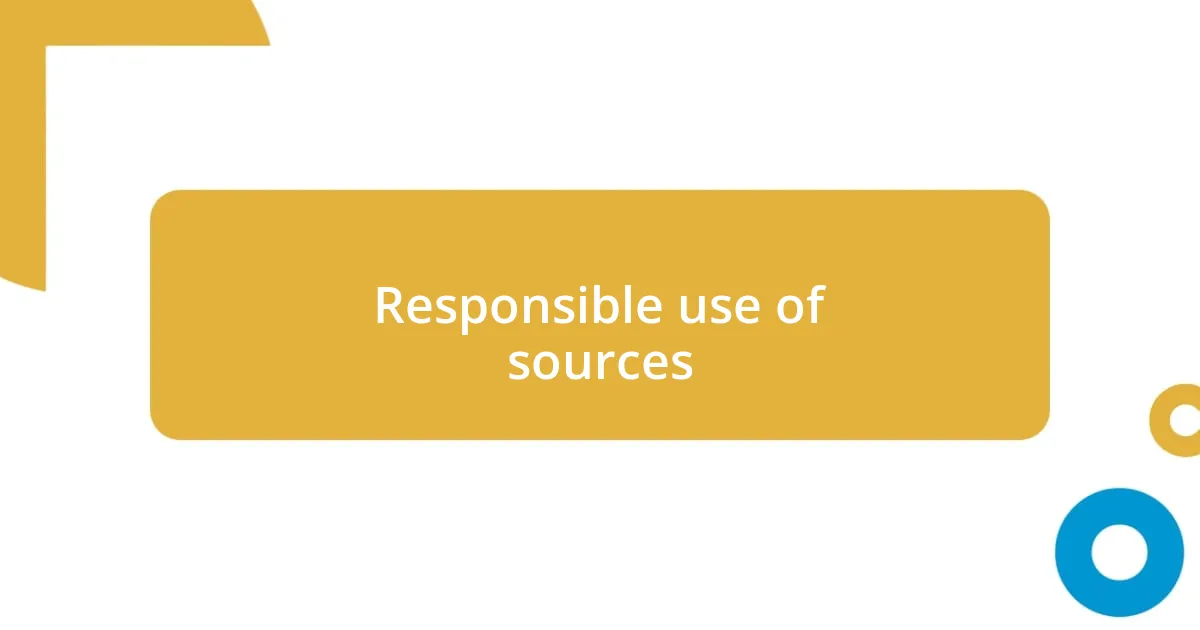
Responsible use of sources
One of the key aspects of the responsible use of sources is recognizing the effort and expertise that goes into each piece of work. I vividly remember a moment when I stumbled upon a lesser-known study that completely reshaped my views on mental health. Instead of treating it as just another source, I found myself reflecting on the researcher’s dedication. This helped me appreciate that every citation in my writing is more than just a requirement—it’s a tribute to the hard work of others.
In my journey as a writer, I’ve developed a keen sense of awareness around the importance of context. For instance, while incorporating a quote from an influential author, I felt an innate responsibility to not only credit them but to also set the right context for their words. When I find myself asking, “How does this quote resonate within my narrative?” it propels me to explore deeper connections and enhances the overall richness of my writing. It’s fascinating how one thoughtful inquiry can lead to an engaging dialogue with my audience.
Moreover, I’ve learned that the responsible use of sources extends beyond academic integrity; it shapes the trust between me and my readers. Recently, while researching a topic close to my heart, I was cautious about using only reliable sources. With so much misinformation out there, I often ponder, “Am I contributing to a knowledge base that empowers my readers?” This thought fuels my commitment to source responsibly, ensuring that I don’t just regurgitate information but offer insights that inspire informed discussions. By prioritizing this ethical stance, I believe I can elevate not only my writing but also my readers’ understanding of complex subjects.
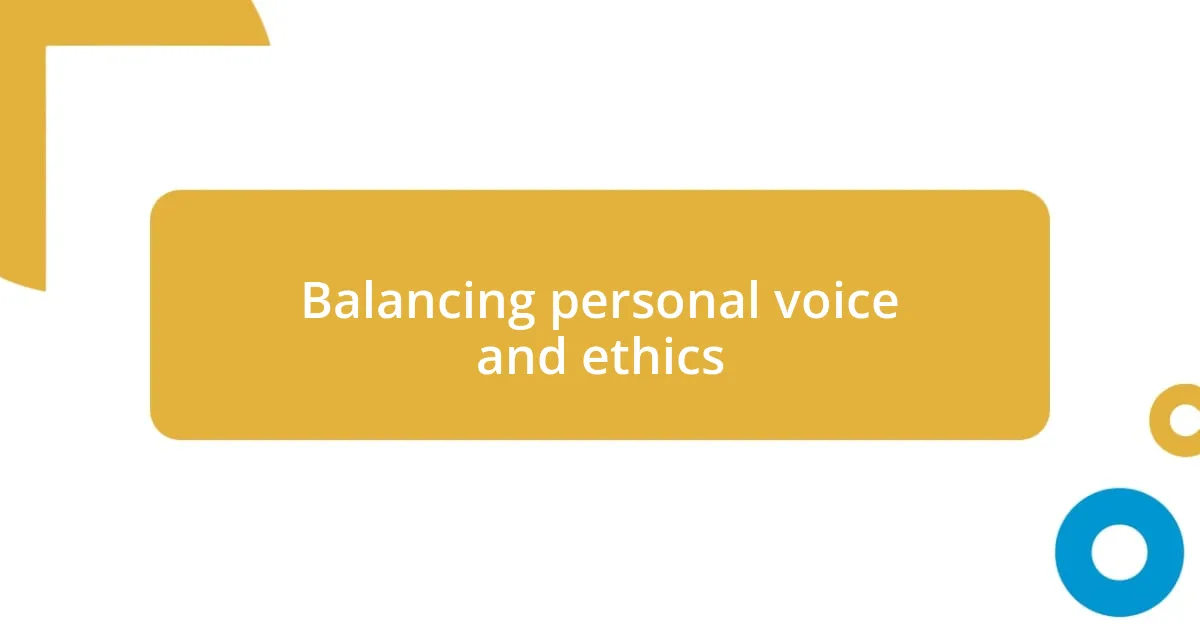
Balancing personal voice and ethics
The challenge of balancing my personal voice with ethical considerations often feels like walking a tightrope. I remember a blog post I was working on where I wanted to share my authentic feelings about a controversial topic. I found myself questioning, “How can I express my truth without alienating those who might disagree?” This reflection led me to carefully choose my words, ensuring that while my opinion was clear, I still respected differing perspectives.
Another aspect of this balancing act is the role of transparency in my writing. When I tackled sensitive subjects—like mental health—I felt a strong urge to weave in my experiences. However, I quickly realized that being open about my struggles didn’t give me a free pass to overlook ethical considerations. I began to ask myself, “Am I serving my audience by sharing my journey, or am I putting my narrative above their need for responsible dialogue?” This introspection guided me to share anecdotes that not only resonated with my voice but also upheld the dignity of the broader conversation.
It’s also about recognizing the power of words and the impact they have. I often find myself saying, “What message am I conveying by sharing this opinion?” Recently, I wrote a piece that touched on systemic issues. While my personal anecdotes added color, I made sure to back them up with factual data and perspectives from those directly affected. In doing so, I struck a balance between my unique voice and the responsibility I felt—to represent both my story and others’ narratives ethically. Each step of this journey reminds me that writing is not just a personal expression; it’s a shared dialogue that deserves respect and mindfulness.





